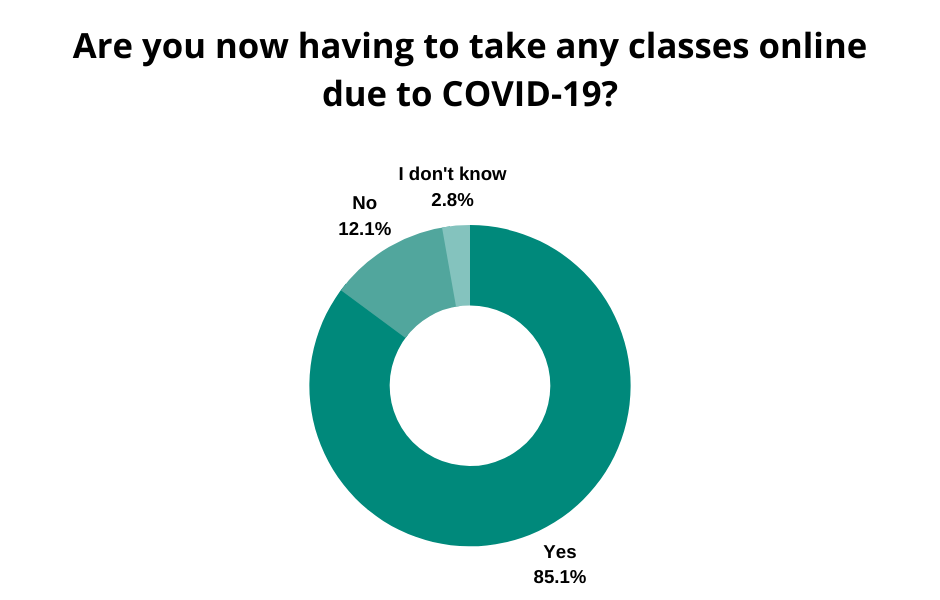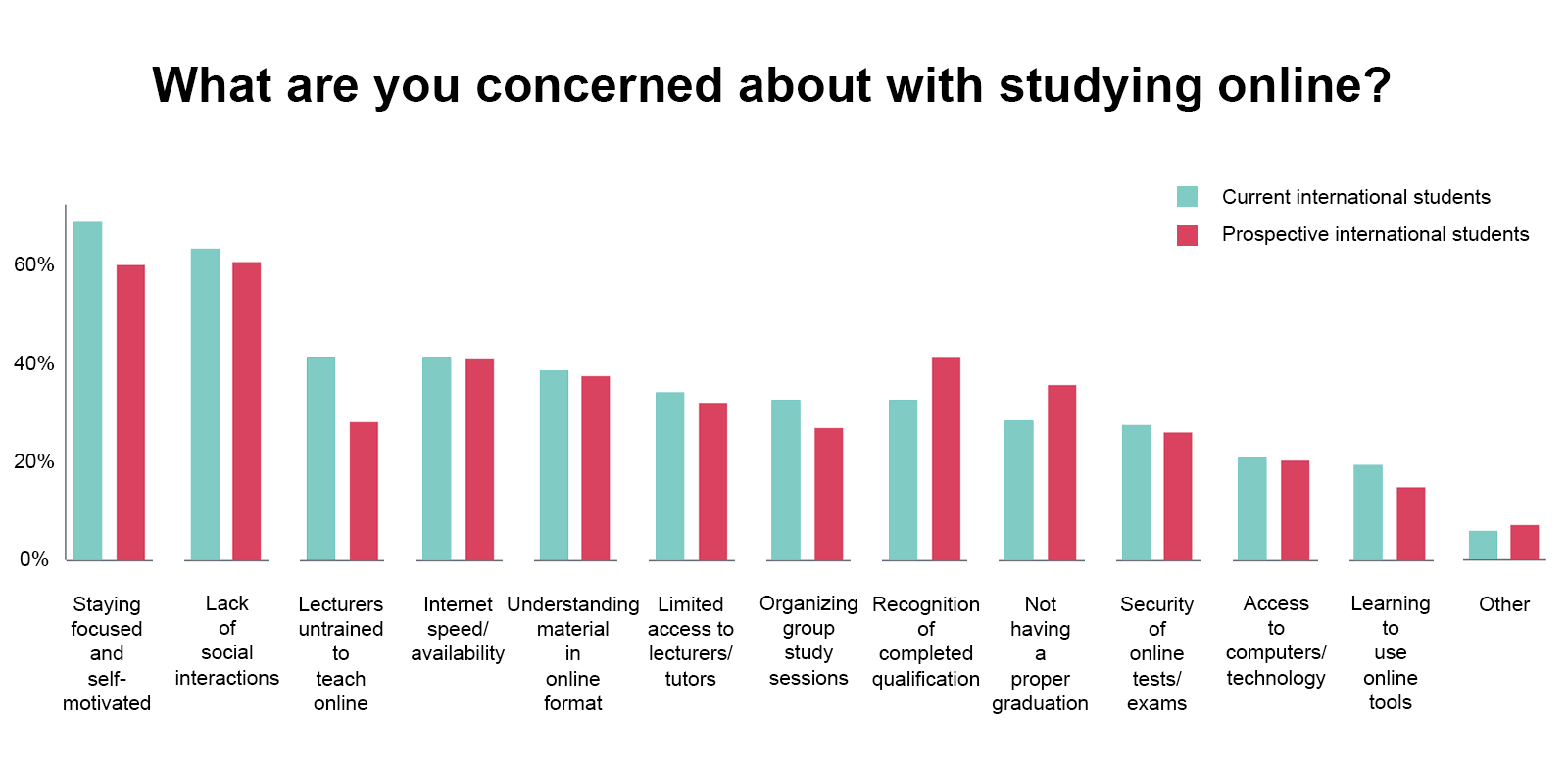Ready or not, higher education institutions of all levels are rushing to provide their programs online with students and staff staying home due to the coronavirus pandemic. Before the current outbreak, online learning was growing in popularity thanks to its many benefits, including affordability, flexibility, and accessibility. However, it was still referred to as ‘the future of education.’ Now that it’s our present reality, how is it measuring up to student expectations?
We at educations.com wanted to find out exactly how students feel about taking classes online, so we surveyed over 7,400 current and prospective international university students. The responses revealed an increased interest in studying online, tempered with some concerns about the implications of a fully virtual university experience.
Is online higher education the new reality?
The world has responded swiftly to the coronavirus outbreak, and so too have universities and students. When we asked current international students if they are taking any classes online due to COVID-19, 85.1% of them answered ‘yes.’ For those taking classes online, the future looks less clear: 39% thought the shift was short-term, almost 25% thought it would be long-term, and 36% did not know yet.

Whatever the future holds for online learning, one thing is clear: Interest from prospective students in pursuing a degree online has quickly climbed. Our survey results showed that 45.2% of prospective international students are interested in studying an online degree due to COVID-19!
Our internal Google Analytics data also reflects this trend: Courses and content related to online and distance learning have experienced a 49% growth in views when comparing March/April 2020 with January/February 2020. That means students are still interested in pursuing degrees, but are looking for courses delivered online so they can continue to social distance.

Image: Comparison of search terms ‘study abroad’ and ‘study online’ 1 year (April 2019 - April 2020) (source: Google Trends)
Similarly, worldwide search trends on Google for the search term 'study online' have increased. A side-by-side comparison with the search term 'study abroad' shows a sharp escalation in 'study online' over the past few months and a deescalation of 'study abroad.' While this indicates that students are actively searching for online learning options, it doesn’t tell the whole story.
What are students’ concerns regarding online learning?
Universities are particularly impacted by isolation measures and closed campuses, their once-packed lecture halls and campus lawns empty in an effort to slow the spread of the virus. Since spending time on campus is often an integral aspect of a student’s study abroad experience, it’s natural that the shift to online learning has had a big impact.
We asked current students taking online classes about their experience so far, and they gave it an average rating of 2.9 out of 5. In contrast, a previous survey we conducted of students currently studying abroad gave their experience a rating of 4.2 out of 5. To account for this lukewarm response to online classes, they listed some of their concerns about taking online courses.
The top concerns cited by current international students were staying focused and self-motivated (68.87%), the lack of social interaction with classmates (63.64%), professors who were not trained to deliver lectures online (41.56%), internet/wifi speed or availability (41.56%), and understanding the material in online format (38.96%).
Similarly, the most frequently cited concerns among prospective international students regarding online learning were the lack of social interaction with classmates (60.86%), staying focused and self-motivated (60.30%), the lack of recognition of the completed qualification (41.42%), internet/wifi speed or availability (41.2%), and understanding the material in online delivery format (37.59%).

Lack of in-person interaction
It may be unsurprising that both current and prospective students are worried about losing out on in-person interaction with classmates, which is an important aspect of both the learning process and the study abroad experience. 63.64% of current students and 60.86% of prospective students cited a lack of social interaction as one of their primary concerns about online learning.
As one student writes on the survey, “teachers should reach out to students to make sure they’re ok. And students should reach out to other classmates to keep in touch.”
Another writes, “Tutors should ask students how they are doing personally and not just how their projects are going.” Although courses may be delivered online, students want to maintain the personal aspect of studying, especially during this emotionally trying time.
Similarly, our survey found that students are concerned about having a “proper graduation” if their degree is awarded digitally. An in-person graduation ceremony in front of faculty and classmates is an important university experience - one that 28.57% of current international students and 35.98% of prospective international students are worried about losing.
Trouble with focus and self-motivation
Focus and self-motivation is another concern felt by both current (68.87%) and prospective (60.30%) international students, and is common among everyone - professionals and students alike - when beginning to work or study from home. Distractions at home, inadequate tools and materials, or simply the anxiety and uncertainty surrounding the coronavirus is enough to test anyone’s focus and motivation.
“Once all seven of my classes were online, it was like I had no control.”
Even for students who are used to learning outside of the classroom, this complete shift to online learning can be challenging. One student told us, “Online studies used to be something I thought I was pretty good at, seeing as I had taken three online courses. However, once all seven of my classes were online, it was like I had no control and could not keep track of assignments or due dates whatsoever. It has 100% made my anxiety skyrocket and has affected my mental health in the worst of ways.”
Though these feelings are completely natural and understandable considering the circumstances, universities should take this as their cue to reach out personally and offer counseling and support to students who are having trouble with motivation or are struggling with their mental health.
Current vs. Prospective International Student Concerns
The different concerns felt by prospective and current international students could be accounted for by their experience with online learning: Current students may have noted that some professors struggle to deliver virtual lessons, while prospective students worry about whether a fully digital degree will be recognized at the same level as a traditional degree.
Unprepared Professors
41.56% of current students are concerned about professors who were not trained to deliver lectures online. As one student points out: “Online studies are not as specific. Maybe because the teachers have still not gotten a hold of using internet technology. It doesn’t work the same as in a classroom. The teachers fail to explain concepts.”
They also express concerns about a lack of communication and support from schools: “I have not been informed about what is going on with my course and have been kept in the dark.”
Quality of Online Degree
Prospective international students may have less experience with online learning, but 41.42% are worried about their degree recognition if all university courses go digital. One student writes, “I wonder how this ultimately affects the quality of education and my grades,” while another wonders, “Is an online degree as valid as an on campus degree?”
These are all valid concerns felt by both current and prospective students that universities are advised to address early and often in order to improve student satisfaction and happiness during this difficult period.
Final thoughts
Students and universities should be commended for their quick move from in-person to online learning. In these unprecedented circumstances, it can be difficult to know what actions to take or how to handle difficulties when they arise. While there are certainly some kinks to work out, it’s reassuring to know that everyone is doing their part to bring us safely through this pandemic. As one student optimistically writes, “The only thing that we can do is stay calm, stay positive, and find new creative ways to continue studying as best as we can.”





%20-%202.png)

